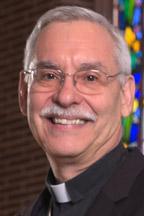
On Friday afternoon, they took Jesus’ body down from the cross, and I imagine that they probably laid him gently in Mary’s arms.
Joseph of Arimathea and John and others did the things that had to be done. Every squeak of the nails as they were twisted out of the wood probably made a corresponding painful twist in the heart of his mother who waited silently below. In spite of the taunts of his enemies and the hopes of his friends, Jesus had not come down from the cross by his own power.
This was a service for which he had to depend on his friends. It was the end of the first Mass said by the first priest, begun in the Upper Room, completed on Calvary among his closest friends.
Because of the magnitude of our sin, only one atoning sacrifice could blot it out — the sacrifice of God’s own sinless, divine Son. Jesus would be both the only possible fully holy priest to offer the sacrifice, and the only possible fully pure victim, sacrificed by his own free will in fulfillment of his Father’s will on the altar of the cross. And so in the fullness of time, when we had strayed for centuries, Christ came to pay our debt and to open the sealed gate to heaven.
In him, and through his tremendous love, not only were our collective transgressions blotted out, we were elevated to a height that we never could have reached without the merits of Christ — given eternal life. No wonder that the Exultet of the Easter Vigil sings so exultantly of Adam’s “happy fault that earned so great, so glorious a Redeemer!”
In saying that we profited by Jesus’ death, I do not exaggerate. Two gifts were given to us: Jesus’ mother and the Eucharist. God might have arranged that Mary would be Jesus’ mother without also making her our mother as well, but Jesus gave her to us with his dying breath when from the cross he said to John, “Behold your mother” and to Mary, “Behold your son” and so she is forever ours. And Christ might also have redeemed us without instituting the Eucharist, but Jesus willed to remain with us all days, even after his departure to heaven, and this was the way that, in his great love, he chose to remain with us.
So not only does he entrust us to the care of his mother, he also provides the way for his bloody sacrifice to be perpetuated in the unbloody sacrifice of the Mass, for our benefit to the end of time. “O happy fault that earned so great, so glorious a Redeemer!”
Easter is a day of baptisms and professions of faith. Often, we miss the point that we are baptized into Jesus’ redemptive death, which is why we sing the Exultet. It is to the degree that we share in his death, that we will also share in his victory.
In baptism, we die with Jesus sacramentally, and once dead, sin no longer has power over us. From this point forward, if we sin, it will not be because of external constraint or because the devil made us do it. If we sin, it will be because we freely choose to do so.
Jesus knows that living a Christian life in a pagan world can be difficult, so even here, if we are repentant, we can trust in God’s mercy and the redemptive power of the cross.
Today is Jesus’ day of victory. It can be our day of victory, too. Those who are united with Jesus in likeness to his death will share in a like resurrection. This share in Jesus’ victory begins in this life for those who have been born again in baptism and live already the life of the Kingdom of God. And it continues in eternal life for those who share fully in Jesus’ victory.
“O happy fault that earned so great, so glorious a Redeemer!”
Bishop Anthony B. Taylor delivered this homily at the Easter vigil Mass March 30.
Please read our Comments Policy before posting.
Article comments powered by Disqus Planned Parenthood’s report shows increase in abortions
Planned Parenthood’s report shows increase in abortions
 Studio 3:16 offers new approach to teaching religion
Studio 3:16 offers new approach to teaching religion
 After three decades, NLR principal plans to retire
After three decades, NLR principal plans to retire
 CHS athlete overcomes odds to reach collegiate goal
CHS athlete overcomes odds to reach collegiate goal
 John Calipari: UA basketball coach and devout Catholic
John Calipari: UA basketball coach and devout Catholic
 St. Joseph a model of solidarity with immigrants
St. Joseph a model of solidarity with immigrants
 Two gifts after Jesus’ death: Virgin Mary and Eucharist
Two gifts after Jesus’ death: Virgin Mary and Eucharist
 Why we have an altar, and not just a communion table
Why we have an altar, and not just a communion table
 Pope: Wars should be resolved through nonviolence
Pope: Wars should be resolved through nonviolence
 Living relationship with Jesus Christ in the Eucharist
Living relationship with Jesus Christ in the Eucharist